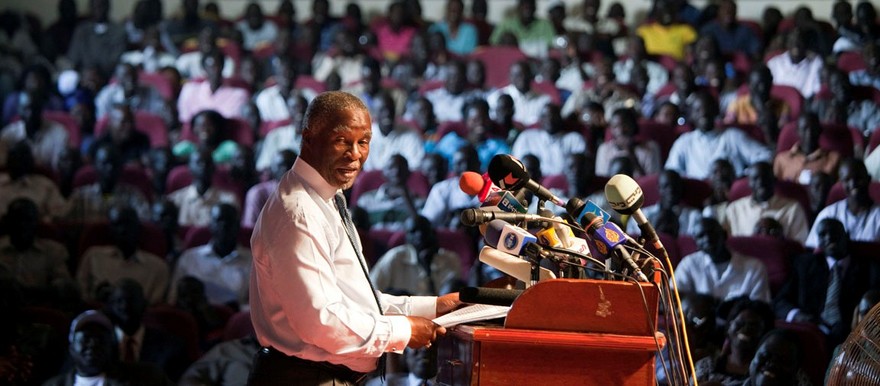The African Union Peace and Security Council in its sitting yesterday decided not to refer Thabo Mbeki’s Abyei proposal to the United Nations Security Council, according to a communiqué issued after the meeting.
The council had resolved 24 October that after a six-week period for talks it “will endorse [Mbeki’s] Proposal as final and binding, and would seek the endorsement by the UN Security Council of the same.”
But according to the resolution passed yesterday, the AU Security Council did not refer the matter to its counterpart in New York, instead remaining silent on its earlier threat.
Pressure from the African Union in the form of its October resolution had not resulted in any new talks between Sudan and South Sudan on the Abyei issue. Related defense talks were convened but have stalled.
“Council notes that the deadline for the Parties to negotiate on the basis of this Proposal expired on 5 December 2012, but that no negotiations had taken place by that time,” the latest council statement read.
The statement urged the two sides to resume negotiations and to convene a summit of the two presidents, Omar al-Bashir and Salva Kiir.
African presidents will discuss the matter again during a meeting in Addis Ababa in January, according to the communiqué:
“Council further refers the determination on the issue of the Final Status of Abyei to its meeting at the level of the Heads of State and Government, to be held on the margins of the 21st Ordinary Session of the Assembly of the Union, in Addis Ababa, in January 2013,” it stated.
Ali Karti, Sudan’s foreign minister, spoke Friday before the African Union Council in opposition of the referral to the UN Security Council.
Karti had predicted the referral would fail, telling the national assembly on 4 December that the Mbeki proposal “will never see the light of day.”
Thabo Mbeki’s proposal calls for the permanent residents of the disputed Abyei region, the Dinka Ngok, to vote in a referendum to join South Sudan in October 2013, while excluding nomadic Misseriya Arabs from the poll.
Mbeki is head of the African Union High Implementation Panel, on which two other former presidents sit, Abdulsalami Abubakar and Pierre Buyoya.
Photo: Thabo Mbeki speaks at the Nyakuron Cultural Center in Juba, two days before South Sudan’s independence referendum, 7 January 2011.




